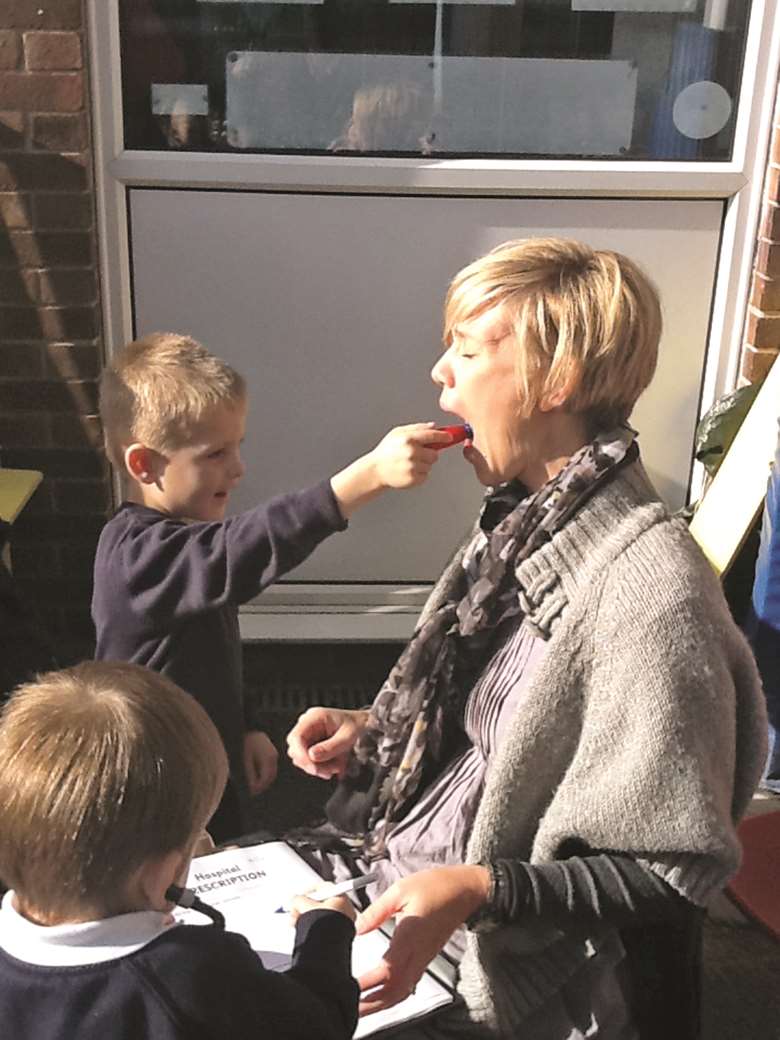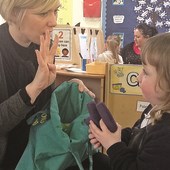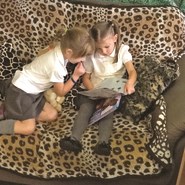Enabling Environments: Team of the Year - Winning out
Monday, November 4, 2013
High Greave Infant School in Rotherham has transformed its provision over the past two years. Ruth Thomson visited to see how it is working to meet the needs of its children.

The winner of the 2013 Nursery World award for School Early Years Team of the Year was High Greave Infant School in Rotherham. Over the past two years, the school has transformed its provision, leaving children feeling secure and confident to learn, teachers free to teach and parents better able to support children's learning.
Early years consultant Penny Tassoni, who worked with the school on part of its reforms, says, 'High Greave has turned around its early years provision through the determination of its staff and head teacher.
'It has focused carefully on the needs of children and has prioritised play and communication opportunities both indoors and outdoors. It is a great example of what can be achieved when a team has a clear vision of what is needed and are ready to put in plenty of hard work.'
High Greave serves one of the most deprived communities in Rotherham, with 61 per cent of its 196 pupils qualifying for school meals - the highest figure in the area. A fifth (21 per cent) of children in the Foundation Stage and Key Stage 1 are on School Action or School Action Plus lists. Also on roll are children with physical, medical and other learning needs.
Visitors to the school cannot help but be struck by the tiny stature of some of the nursery children. The vast majority arrive with a developmental age of 16 to 26 months when assessed across all 17 goals, though for some their speech development falls within the eight to 20 months age band. Topping the list of their needs is language delay, followed closely - this year at least - by poor physical development.
A CLEARER FOCUS
The overhaul of practice started with the Foundation Stage, when the two Foundation Stage units, of more than 40 children each, were divided into two reception classes and a separate nursery. Each class is staffed by one teacher and two teaching assistants, bringing them in line with other classes in the school.
'When I look back, the units were noisy and overcrowded and we were very much managing each day as it came rather than making it a fulfilling learning experience for the children,' says infant head of Rachel Taylor. 'Now, staff have smaller groups of the same age and can be much more focused on targeting the learning and additional needs of the children.'
Next came a refurbishment. 'Resources were poor, so we've redecorated, re-carpeted and refurnished,' says Mrs Taylor. Wooden furniture, quiet bays and displays are now features of all the classrooms. The reception area is filled with framed photos of the children, while the wide central corridor is lined with slim bookshelves on one side and the other is broken up by learning bays linked to current projects. Small storerooms were also revamped as 'intervention spaces', where a staff member and child can retreat for special support.
More recently, the school has turned its attention to the outdoors. The single area that circled the school has now been divided up to create dedicated areas for every classroom, all of which enjoy free-flow access. Each space has a covered area, a shed and some simple, open-ended resources, and is partitioned by high fences to create secluded areas.
CONSISTENCY
 Consistency has been a major theme within the school's transformation. Outdoor and indoor spaces share features that are reassuringly predictable for children, while retaining the flexibility to be stimulating and responsive to children's learning.
Consistency has been a major theme within the school's transformation. Outdoor and indoor spaces share features that are reassuringly predictable for children, while retaining the flexibility to be stimulating and responsive to children's learning.
Rules and routines are essentially the same across the school. From nursery, children learn the 'Choose it, use it, put it away' rule and know that the Mission Impossible theme tune signals tidy-up time.
'We've made major steps forwards in the past 18 months,' says Mrs Taylor. 'Before, there were different expectations in different classrooms, but now children are happy because they know what they're coming into. The same rules apply to everybody, everywhere. It also makes parents realise the importance of setting routines and expectations early on.'
The school's approach to behaviour is based on rainbow LEARNER bands where the children are expected to Listen, make an Effort, Achieve, show Respect, be Neat, Enjoy and be Ready. Having achieved as a 'basic' LEARNER, children are rewarded with added privileges and responsibilities as they progress to become Bronze, Silver and Gold learners.'
When a child fails to meet expectations, their LEARNER band is removed for a day but returned with a constructive message. 'We approach it in a positive way,' explains Mrs Taylor. 'The system isn't used in nursery, but children are introduced to the LEARNER expectations.
'Staff have to work for their bands as well and can have their bands removed if, for example, they exceed the three mile an hour rule when moving around school. And parents have sometimes asked for the bands as well, so they can continue with the same approach at home.'
The drive for consistency has been helped by the High Greave Infant and Junior schools becoming one federation with an executive head. Though attached, the two schools previously operated independently, but now policies and procedures apply across both settings.
EMOTIONAL AND SOCIAL
Another objective has been to address children's emotional and social needs and this is something that has often gone hand in hand with the school's efforts to promote children's communication skills.
Smaller classes, revamped learning environments and a consistent approach have all benefited children's well-being and increased opportunities for engagement.
Additionally, the school runs Tribe Time twice daily, when reception and KS1 children meet in small mixed-age groups for a 20-minute session. The sessions are based on circle time, use Social and Emotional Aspects of Learning, or SEAL, objectives and have a focus on communication and language. In nursery, the children meet in their key worker groups and the same principles apply.
 Mrs Taylor explains, 'Tribe Time builds strong relationships and makes children feel safe and secure. It gives them opportunities to share any concerns and celebrate their efforts and achievements, while adults are able to model good spoken language and extend children's vocabulary.'
Mrs Taylor explains, 'Tribe Time builds strong relationships and makes children feel safe and secure. It gives them opportunities to share any concerns and celebrate their efforts and achievements, while adults are able to model good spoken language and extend children's vocabulary.'
Weekly sessions with a speech and language therapist offering a activities such as rhymes and games is another way in which the school seeks to address children's language skills and identify those with needs requiring other forms of intervention.
Other invaluable team members are the federation's four learning mentors, one of whom is classed more as a family worker.
Mrs Taylor explains, 'Our learning mentors' role is above and beyond what some learning mentors will do because of the needs of our children and families. They have many hats. They support children a lot in classes and one-to-one therapy-like sessions and also do a lot to support parents.'
WORKING WITH PARENTS
As well as offering home visits, the school tries to engage parents in a variety of non-threatening ways. Examples include exhibitions of children's work that parents can visit at their leisure, craft classes, baking sessions and stay-and-play in nursery.
Also effective is the school's Trees of Success, which feature in each Early Years Foundation Stage classroom. Parents are invited to write a comment about their child on a Post-it note and stick it to the tree. Mrs Taylor explains, 'It's a way of trying to get parents to contribute to their children's profile and show that everything they do with their children, like a walk in the park, is valuable to their child's development.'
LEARNING
So what of the school's approach to learning? Planning is responsive to the children's interests and needs.
Topics are introduced in thought-provoking ways. A round-the-world trip by a toy called Betty Bear provided a hook for KS1's explorations of materials and properties. Last winter, reindeer appeared magically in the schools' shared garden.
Children are also consulted on what they have learned and would like to learn about, while displays featuring their work change regularly.
In the future, the school would like to become an outstanding-rated early years setting, says Mrs Taylor, and 'Ideally, we would love to have a children's centre on site so that we could engage with parents from the birth of their child and meet their needs better by signposting them to the services they need.'
For the moment, the staff can enjoy some of their recent successes. 'This year, we were above local authority averages for the Profile, which we've never been before,' says Mrs Taylor. 'And that helps us to set targets for the coming year.'




